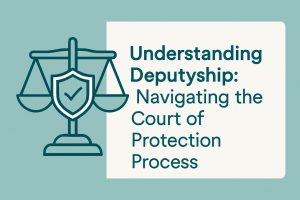Deputyship and the Court of Protection: What Families Need to Know
Court of Protection – Deputyship
 It is a fact of life that as a nation we are living much longer. Because of this, more and more of you will inevitably have a period of physical and mental incapacity later in life. There are estimated to be over 900,000 people in the UK with dementia and this will rise to 1.4 million by 2040. But not all people are responding to these statistics and taking the practical steps at the right time to help relatives cope when they can no longer make financial or personal decisions for themselves. Making a Lasting Power of Attorney (LPA) would be the vital step to take, but if you have not taken this action early enough when you are of sound mind, your relatives will be faced with the more complex and expensive alternative of applying to the Court of Protection to be appointed as a deputy to run your affairs.
It is a fact of life that as a nation we are living much longer. Because of this, more and more of you will inevitably have a period of physical and mental incapacity later in life. There are estimated to be over 900,000 people in the UK with dementia and this will rise to 1.4 million by 2040. But not all people are responding to these statistics and taking the practical steps at the right time to help relatives cope when they can no longer make financial or personal decisions for themselves. Making a Lasting Power of Attorney (LPA) would be the vital step to take, but if you have not taken this action early enough when you are of sound mind, your relatives will be faced with the more complex and expensive alternative of applying to the Court of Protection to be appointed as a deputy to run your affairs.
In actual fact, it is not only the elderly for whom a deputyship order may be necessary. Some people may never have the choice of making an LPA if they have lacked capacity from birth. A child with severe learning difficulties may need a deputy appointed to act for them when they transition into adulthood and the automatic right of parental responsibility ends.
There are two types of deputyship order: property & financial affairs and health & welfare. General health and welfare orders are less common as the court takes the view that best interest decisions for a person’s health, medication and care should be taken by the family, health and care professionals collectively if that can be achieved.
A deputy can be a relative or close friend over the age of 18 or a professional deputy. More than one deputy can be appointed ‘jointly’ or ‘jointly and severally’.
It can take approximately 6 months to obtain a deputyship order from the start of the application, however, it may be longer if the court raises queries or complications arise.
Once appointed, a deputy’s powers are limited to the terms of the deputyship order which will depend on what is requested in the application. A standard order to manage someone’s property and finances would not normally include the sale of property and so additional permission would be required for this. Selling a jointly owned property has further complexities. In terms of making gifts on behalf of the mentally incapacitated person, the standard authority is usually very limited meaning that substantial or ‘one off’ gifts will necessitate a separate application to the Court of Protection.
A deputy must always act in the best interests of the person who lacks capacity and have regard to the principles of the Mental Capacity Act 2005. Their responsibilities include keeping accurate accounts and records of the transactions they have carried out and filing an annual report to the Office of the Public Guardian (OPG) explaining the decisions they have made. Deputies are supervised by the OPG who may contact or visit them to ensure they are carrying out their duties adequately.
For more information, please contact:
anne-marie.worth@mogersdrewett.com

